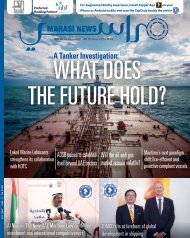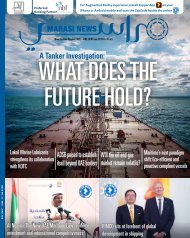You also want an ePaper? Increase the reach of your titles
YUMPU automatically turns print PDFs into web optimized ePapers that Google loves.
All losses are excluded unless<br />
they arise during a "Maritime<br />
Adventure"<br />
At law, all losses are excluded<br />
unless they arise during a "maritime<br />
adventure" (s. 3 MIA 1906) and<br />
are "proximately caused" by a peril<br />
named in the insurance policy<br />
(s.55 MIA 1906). A "maritime<br />
adventure" means that the ship or<br />
the Assured's earnings are exposed<br />
to "maritime perils"; these are "the<br />
perils consequent on, or incidental<br />
to, the navigation of the sea" (s.<br />
3(2) MIA 1906). Importantly, “perils<br />
of the seas” does not cover ordinary<br />
action of the winds and waves, only<br />
"fortuitous accidents or casualties of<br />
the seas". In other words, something<br />
has to be left to chance.<br />
In the same way, s.55(2)(a) prevents<br />
an assured from insuring against his<br />
own "wilful misconduct" (s.55(2)<br />
(a)), although cover is available for<br />
misconduct or negligence of the<br />
master or crew. Again, that makes<br />
sense; an Assured should not be able<br />
to insure against his own sabotage.<br />
Cover for delay and for loss caused<br />
by "inherent vice" is also excluded<br />
at law, although ss. 55 (2)(b) and<br />
(c) allow the parties to contract<br />
out of that provision. Inherent vice<br />
was defined by the decision in Soya<br />
GmbH Mainz Kommanditgesellschaft<br />
v. White [1983] 1 Lloyd’s Rep 122.<br />
That case was about a cargo of<br />
soya beans that were damaged in<br />
transit when they started to sweat.<br />
The Court held it means "the<br />
risk of deterioration of the goods<br />
shipped as a result of their natural<br />
behaviours in the ordinary course of<br />
the contemplated voyage without<br />
the intervention of any fortuitous<br />
external accident or casualty", i.e. the<br />
loss was caused by something within<br />
the goods themselves.<br />
“Proximate cause” was defined by<br />
the English House of Lords in The<br />
"Ikaria" [1918] AC 350 HL. In that<br />
case, the Court had to decide whether<br />
the ship's sinking had been caused by<br />
the torpedo that hit her during the<br />
First World War, or the Le Havre<br />
port authority's decision to move her<br />
outside the port. The Court held it<br />
meant the cause without which the<br />
loss would not have happened, “…<br />
the real efficient cause to which the<br />
event can be prescribed”. It does not<br />
mean the cause which is nearest in<br />
time to the loss. The question of the<br />
proximate cause is a question of fact,<br />
which in practical terms means it<br />
is very difficult to appeal in English<br />
law. Finally, the Court will not be<br />
impressed by complicated theories<br />
of proximate cause. Following the<br />
decision in Noten BV v. Harding<br />
[1990] 2 Lloyd’s Rep 283, “…this is<br />
a question to be answered applying<br />
the common sense of a business or<br />
seafaring man.”

















